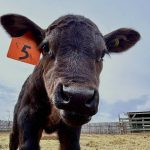Sask. premier points to signs of tariff progress after trip to China
While a recent trip to China brought no immediate changes, Saskatchewan Premier Scott Moe said the tone of discussions was more positive than he expected.
Moe and Kody Blois, who is parliamentary secretary to the Prime Minister, met with Chinese trade officials to talk about tariffs on Canadian canola and peas.
Moe told media there’s a real opportunity to recalibrate the trade relationship and to move forward in a constructive way. He pointed to the reactivation of the Joint Economic Trade Commission and discussions between Ottawa and China’s vice-minister of commerce.
Moe said he hopes for more negotiations at the upcoming G20 and APEC summits.
Message to provincial agriculture ministers: focus on international trade
Securing markets in the face of increasing protectionism should be top priority for Canada’s agriculture ministers. That was the message from panelists at the federal-provincial-territorial ministers’ meeting this month.
Alongside Chinese tariffs and tensions with the U.S., market access in Europe is an issue for multiple commodities said Manitoba Pork general manager Cam Dahl.
Preserving and improving existing large markets is critical, said Colin Hornby who is general manager of Keystone Agricultural Producers. He said the U.S. and China can’t be replaced.
Unpredictable access to the U.S. is a significant risk for food manufacturers, said Food and Beverage Canada CEO Kristina Farrell.
“Canada leads in free trade agreements, but non-tariff barriers blunt reciprocal access,” she said. “Diversification must deliver practical market entry.”
Farrell said her sector also needs certainty in Canada. She pointed to Bill C-5, The One Canadian Economy Act. She said it raises food safety concerns because it risks equating provincial and federal regulatory systems, which aren’t entirely equivalent.
BASF says Canada’s regulatory model is broken
Crop input giant BASF says it can’t commercialize a new canola variety until the Pest Management Regulatory Agency completes it’s re-evaluation of herbicide glufosinate.
That review has been in progress since 2018.
The PMRA’s decision was scheduled for 2022 or 2023, but due to multiple delays, it’s not expected until 2027.
BASF told the Western Producer that this reflects a broken regulatory model – one that can’t keep pace with global innovation.
Federal agriculture minister Heath MacDonald agreed that federal agencies need to speed up decision making. While in Winnipeg earlier this month, he told media he’s pushing the PMRA and CFIA to do better.
He said presentations at the Winnipeg meetings showed some change at the CFIA.
Health Canada has also pledged to make improvement including exempting low-risk products from renewals and conducting more joint reviews with trusted foreign regulators.








